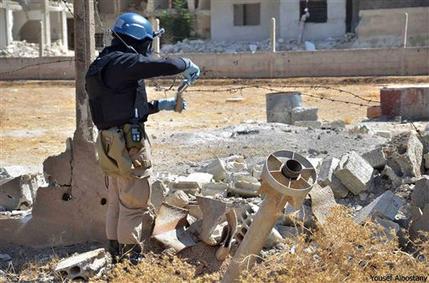AP
August 29, 2013
The intelligence linking Syrian President Bashar Assad or his inner circle to an alleged chemical weapons attack that killed at least 100 people is no “slam dunk,” with questions remaining about who actually controls some of Syria’s chemical weapons stores and doubts about whether Assad himself ordered the strike, U.S. intelligence officials say.
President Barack Obama declared unequivocally Wednesday that the Syrian government was responsible, while laying the groundwork for an expected U.S. military strike.
“We have concluded that the Syrian government in fact carried these out,” Obama said in an interview with “NewsHour” on PBS. “And if that’s so, then there need to be international consequences.”
However, multiple U.S. officials used the phrase “not a slam dunk” to describe the intelligence picture – a reference to then-CIA Director George Tenet’s insistence in 2002 that U.S. intelligence showing Iraq had weapons of mass destruction was a “slam dunk” – intelligence that turned out to be wrong.
A report by the Office of the Director for National Intelligence outlining that evidence against Syria is thick with caveats. It builds a case that Assad’s forces are most likely responsible while outlining gaps in the U.S. intelligence picture. Relevant congressional committees were to be briefed on that evidence by teleconference call on Thursday, U.S. officials and congressional aides said.
The complicated intelligence picture raises questions about the White House’s full-steam-ahead approach to the Aug. 21 attack on a rebel-held Damascus suburb, with worries that the attack could be tied to al-Qaida-backed rebels later. Administration officials said Wednesday that neither the U.N. Security Council, which is deciding whether to weigh in, or allies’ concerns would affect their plans.
Intelligence officials say they could not pinpoint the exact locations of Assad’s supplies of chemical weapons, and Assad could have moved them in recent days as U.S. rhetoric builds. That lack of certainty means a possible series of U.S. cruise missile strikes aimed at crippling Assad’s military infrastructure could hit newly hidden supplies of chemical weapons, accidentally triggering a deadly chemical attack.
Over the past six months, with shifting front lines in the 2 1/2-year-old civil war and sketchy satellite and human intelligence coming out of Syria, U.S. and allied spies have lost track of who controls some of the country’s chemical weapons supplies, according to one senior U.S. intelligence official and three other U.S. officials briefed on the intelligence shared by the White House as reason to strike Syria’s military complex. All spoke on condition of anonymity because they were not authorized to discuss the Syrian issue publicly.
 Daily Stormer The Most Censored Publication in History
Daily Stormer The Most Censored Publication in History



